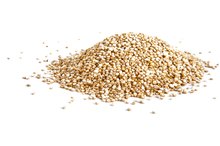Vegetarian vs. Omnivores Facts
Vegetarianism is based on the concept of not eating meat, although some vegetarians include dairy, eggs, fish or even poultry. The diets of omnivores include both plant materials and animal foods -- often red meat. Humans are natural-born omnivores, but some people choose to become vegetarian. There are pros and cons to each diet.
Protein Differences
Because vegetarian diets exclude most or all animal products, they can be lower in protein, especially complete proteins available through meat. Complete proteins contain all essential amino acids, the "building blocks" of protein. Most plant-based foods have some essential amino acids but not others, so vegetarians may need to combine plant-based protein foods -- for example, legumes and grains or seeds -- to get the essential amino acids available in meat, eggs and dairy.
Vitamins and Minerals
Amino Acids That You Can't Get from a Vegetarian Diet
Learn More
Vegetarian and omnivore diets can vary in their vitamin, mineral and fatty acid levels. For example, vitamin B-12 is generally found only in animal products, so supplementation is necessary in a vegan diet but not in an omnivorous diet. Vegetarians may also need to find alternative sources of iron, zinc, calcium and other nutrients found in meats and dairy products. Iron-rich vegan foods include beans, while some leafy greens, such as broccoli, bok choy and kale, offer calcium.
Good and Bad Fats
Omnivores may allow themselves a wide variety of foods, but both diets have their pros and cons. For example, trans fats and saturated fats -- known as the "bad" fats -- present in some meats and dairy products can cause high cholesterol levels and lead to possible heart problems. Vegetable-rich diets, however, offer antioxidants and other health benefits, and "good" vegetable fats like olive oil can help protect the heart and the body in general.
Creating Healthy Diets
Importance of Protective Foods in Balanced Diet
Learn More
Whether you're pursuing an omnivore's diet or a vegetarian lifestyle, it's valuable to make vegetables and fruits the center of your attention. Consider Harvard's Healthy Eating Plate, which recommends eating at least 50 percent vegetables and fruits -- preferably more vegetables than fruits. Complement that with about 25 percent whole grains and 25 percent healthy proteins. Top it off with a drizzle of healthy oils and lots of water for a great vegetarian or omnivorous diet.
Related Articles
References
Writer Bio
Sarah Whitman's work has been featured in newspapers, magazines, websites and informational booklets. She is currently pursuing a master's degree in nutrition, and her projects feature nutrition and cooking, whole foods, supplements and organics. She also specializes in companion animal health, encouraging the use of whole foods, supplements and other holistic approaches to pet care.









